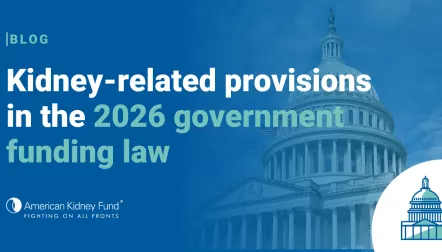
Blog post
Pride Month: How kidney professionals can support the LGBTQ+ community this month and beyond

Pride Month is a time to lift up LGBTQ+ voices. It's also an opportunity to reflect on the work that's still needed to advance equity in critical spaces, including within health care.
The reality is kidney disease doesn't exist in a vacuum. Discrimination, limited affirming care and stigma can impact how and when LGBTQ+ patients engage with our health care system. As members of this system, we should ask ourselves if we're creating spaces where LGBTQ+ individuals — especially people of color or living with lower incomes — feel seen and supported in managing their kidney health.
Barriers to kidney care
People in the LGBTQ+ community face many systemic hurdles that can negatively impact kidney health outcomes, including:
- Medical mistrust: Past experiences of biases or misgendering can lead to a patient delaying going to the doctor or putting off routine screenings, including those that could detect early kidney damage.
- Lack of inclusive care and personalized guidance: For those who already have a kidney-related disease or are in kidney failure, it can be hard to find a provider with the knowledge or comfort to engage in important health conversations or advocate for their patients in our community. This can be even more difficult for transgender patients.
- Limited research and data: Most kidney disease research doesn't account for information on sexual orientation or gender identity, which makes it harder to see trends or advocate for resources. And, though some studies are underway, many specialists aren't even aware of these limitations.
What does inclusive kidney care look like?
Delivering LGBTQ+ affirming care requires intentional, ongoing work and the consideration of intersectionality (how race, class, gender and sexual identity combine) within patient care. Here are a few ways to meaningfully support patients:
- Screen for social determinants of health: Understand how factors like housing instability, employment, race, mental health concerns and more could factor into patients' wellbeing.
- Build trust through transparency: Have an open discussion with patients about their needs and take other treatments into account that may (or may not) impact their kidney health (like hormone therapy or HIV medicines). Don't be afraid to ask respectful questions instead of guessing.
- Prioritize representation: Make sure LGBTQ+ people and people from minority communities are in the room where decisions happen. Include them in education campaigns, patient advisory boards, community partnerships and clinical trials.
- Educate yourself and your staff: Go beyond the one-time trainings. Work affirming care into your professional development and use databases and tools to see how others have made long-term changes for inclusivity. Here are some helpful resources we encourage you to explore:
Pride is more than a month
Pride Month is a reminder that equity isn't passive. It's built through new policies, a lot of practice and the everyday ways you can tailor care to your patients.





